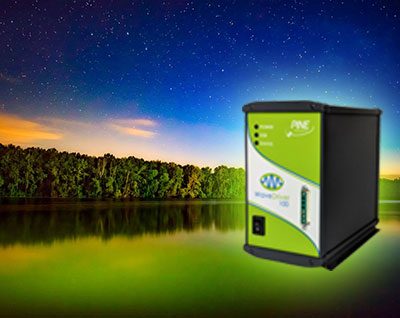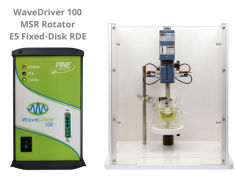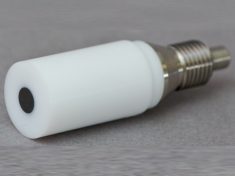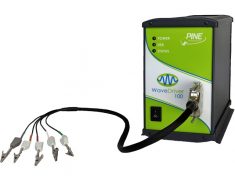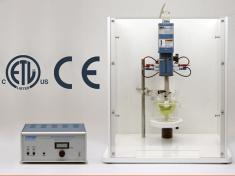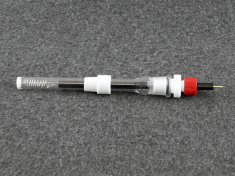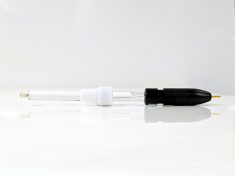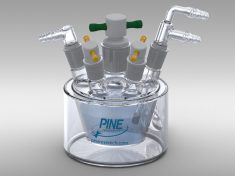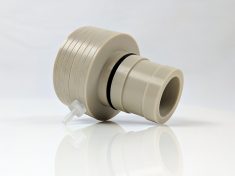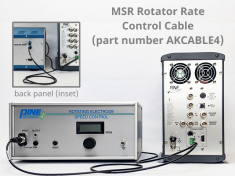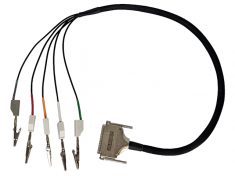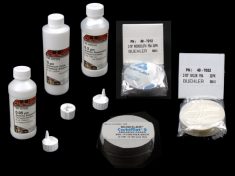| # | Description | Price in USD | |
|---|---|---|---|
| Potentiostat/Rotating Disk Electrode (RDE) Bundle | |||
| [WD100-MSR-RDE-E5] |
MSR Rotator Rotating Disk Electrode with WaveDriver 100 Bundle includes WaveDriver 100 potentiostat, MSR Rotator, software, cables, electrodes, cell, and accessories |
||
| Power Cords |
this bundle includes two power cords |
||
| List of All Items Included in Bundle | |||
| Software | |||
| AFP5 |
WaveDriver 100 EIS Potentiostat/Galvanostat |
||
| ACP5E01 |
WaveDriver Potentiostat Cell Cable |
||
| AFMSRCE |
Pine Research MSR Rotator the most popular electrode rotator in the world |
||
| AKCABLE4 |
Rotation Rate Control Cable |
||
| AFE5T050GC |
Glassy Carbon RDE Tip disk material is not removable from RDE tip maximum rotation rate is 2500 RPM - never exceed maximum rotation rate when working with rotating electrodes. |
||
| AFE6MB |
RDE/RRDE Shaft for MSR Rotators |
||
| AFCTR5 |
Standard Platinum Counter Electrode Kit |
||
| RREF0021 |
Single-Junction Silver Chloride (Ag/AgCl) Reference Electrode |
||
| AKCELL3 |
Jacketed Glass Cell for Rotating Electrodes |
||
| AC01TPA6M |
Gas-Purged Bearing Assembly |
||
| AKPOLISH |
Polishing Solutions and Materials Kit |
||
The best way to work with a Pine Research Rotating Disk Electrode (RDE) system is to pair it with a Pine Research electrochemical workstation. This bundle gets you started with a glassy carbon RDE tip (fixed disk), a WaveDriver® series potentiostat/galvanostat, and a Pine Research Modulated Speed Rotator (MSR) – the most popular electrode rotator in the world.
Under the control of our powerful AfterMath® software package, the WaveDriver 100 is capable of performing Electrochemical Impedance Spectroscopy (EIS) and a wide range of DC electroanalytical techniques including several Rotating Disk Electrode (RDE) voltammetry techniques.
The versatile Pine Research MSR Rotator lets you get started immediately with RDE experiments. The WaveDriver 100 potentiostat plays well with the Pine Research MSR Rotator and is able to automatically control the rotation rate while measuring electrochemical signals. This RDE start-up bundle includes the following principal items along with compatible cables and accessories:
- WaveDriver 100 EIS Potentiostat/Galvanostat
- Pine Research MSR Rotator with Fixed-Disk Glassy Carbon RDE tip
- Pine Research AfterMath Software
- Jacketed RDE Cell (glass) with Pt Counter and Ag/AgCl Reference Electrode
The WaveDriver® 100 EIS Potentiostat/Galvanostat has been engineered to provide you with the essential hardware and software features you need at an affordable price. A complete electrochemical workstation, the WaveDriver 100 lets you perform a wide variety of common DC electroanalytical techniques as well as Electrochemical Impedance Spectroscopy (EIS). The WaveDriver 100 finds use across a wide variety of applications, offering a large range of accessible current ranges (±100 nA up to ±1 A) and potential ranges (±2.5V up to ±15 V) along with advanced filtering, iR compensation, and EIS frequencies up to 1 MHz.
To perform Rotating Ring-Disk Electrode (RRDE) experiments, a bipotentiostat is required. If you are contemplating future RRDE research, choose one of our WaveDriver 200 bundles instead.
Our talented team of engineers and chemists have taken a careful approach at integrating EIS into our WaveDriver series potentiostats. Our software engineering team has incorporated EIS equivalent circuit fitting directly into our AfterMath® software platform. Multiple curve fitting algorithms and options allow you to fit even the most troublesome data. This instrument is a cost-effective tool you can use to make a wide variety of electrochemical measurements in your research work. Some of the unique features to our approach to EIS analysis are summarized below:
Integrated Curve Fitting and Analysis. Our software team has seamlessly integrated EIS curve fitting into AfterMath. Why work with more than one software application to fit your EIS data when you can do it using the very same software application that acquired the data? AfterMath EIS curve fitting utilities provide several analyses, including Circuit Fit, Transmission Line, and Kramers-Kronig. Unlike others, our fitting software also provides several fitting methods including Modified Levenberg-Marquardt (LM), Simplex, and Powell algorithms in addition to fitting options that include dynamic point selection, unity, and parametric fitting.
Novel Transmission Line Fitting. AfterMath provides a unique approach to model your porous electrodes. While the transmission line model is not new, AfterMath provides you with some unique transmission line fitting tools. Instead of a static circuit, where you have no control over the elements of the model, we provide a very flexible basic model, from which you can customize nearly all aspects of the model to suit your system. Give it a try – import your three- or five-column EIS data directly into AfterMath and see the difference with our transmission line fitting.
Finishing Touches. While fitting your EIS data, why flip back and forth between Nyquist and Bode plots? Why not be able to view both plots and fits simultaneously? We heard this feedback from many customers and have designed AfterMath to provide you with both plots simultaneously during fitting. You can also draw your own equivalent circuits to fit your particular system.
What makes the WaveDriver 100 bipotentiostat even more powerful?
Combining it with a precision electrode rotator manufactured by Pine Research…
MAXIMUM ROTATION RATE: Each electrode tip model used with the Pine Research MSR Rotator has a maximum rotation rate. Do not the exceed maximum rotation rate when working with rotating electrodes.
The Pine Research MSR Rotator is the most popular rotating electrode configuration worldwide. This flexible electrochemical instrument may be used with Rotating Disk Electrodes (RDE), Rotating Ring-Disk Electrodes (RRDE), and Rotating Cylinder Electrodes (RCE). The MSR Rotator bears both the CE and ETL marks and is compatible with most international power configuration standards.
The rotation rate of the electrode may be adjusted using a control knob on the front panel of the motor control unit, or alternately, the rotation rate can be controlled via an analog control signal provided by a potentiostat or by a third-party waveform generator. The rotation rate may be viewed using the LCD display on the front panel. The rotation rate is adjustable over a range from 50 to 10,000 RPM and is accurate to within 1% of the reading on the display. A rotation rate may also be monitored via an output signal proportional to the rotation rate which is available on the front panel.
The rotation rate may be controlled and modulated by a sine wave, square wave, or other externally generated waveform. The outstanding acceleration characteristics of the motor and its control circuitry allow the rotation rate to follow the control waveform with very little error. This feature is particularly desirable for techniques such as Hydrodynamic Modulation Voltammetry (HMV) .
The rotator motor position is easily raised or lowered with respect to the cell platform, making immersion or removal of the rotating electrode tip quick and easy. The enclosure base is made from chemically resistant polypropylene, and the large enclosure window provides a good view of rotating electrode during operation. (A smaller base is available separately for using the rotator in a glove box or fume hood.)
Electrode connections are made to the rotating shaft using silver-carbon brushes. There are two contacts – the red is for the disk, and the blue is for the ring. If you are contemplating future RRDE research, then be sure to choose one of our WaveDriver 200 bipotentiostat/galvanostat bundles instead of a WaveDriver 100 bundle.
Visit our YouTube channel for helpful instructional videos regarding the use and maintenance of this and many other Pine Research products.
All specifications are subject to change without notice.
| WaveDriver 100 EIS Potentiostat / Galvanostat | |
|
Working Electrode Channels |
1 |
|
Measured Current Ranges |
±1 A, ±100 mA, ±10 mA, ±1 mA, ±100 μA, ±10 μA, ±1 μA, ±100 nA |
|
Autoranging |
Yes |
|
Practical Current Range |
20 pA to 1.0 A |
|
ADC Input |
16 bits |
|
Compliance Voltage |
>±17 V |
|
Measured Potential Ranges |
±15.0 V, ±10.0 V, ±2.5 V |
|
CV Sweep Rate (min) |
10 μV/s (469 μV per 46.9 s, 313 μV step per 31.3 s or 78 μV per 7.8 s) |
|
CV Sweep Rate (max) |
75 V/s |
|
Point Interval |
80 μs (minimum) |
|
EIS Capable |
Yes |
|
EIS Frequency Range |
10 μHz - 1 MHz |
|
Instrument Dimensions |
160 × 324 × 255 mm |
|
Instrument Weight |
4.6 kg (10.2 lb) |
|
Interface |
USB |
|
Wireless Capable |
No |
Additional Specifications |
|
| Modulated Speed Rotator (MSR) | |
|
Rate Accuracy |
100 to 200 RPM: Accurate to within ±2 counts of display reading |
|
Rate Control (external) |
Optional rate control via input signal on control unit front panel |
|
Rate Output |
Allows optional external monitoring of rotation rate (banana jack, control unit front panel) |
|
Maximum Continuous Torque |
28.3 mN m |
|
Motor Power |
15 W |
|
Electrode Connections |
Disk electrode: red banana jack on motor unit |
|
Dimensions |
Control unit: 11.4 × 10.1 × 5.75 in (29 × 26 × 15 cm) |
|
Shipping Information |
Shipping weight: 60 lb (27 kg) |
|
Rotating Disk (RDE) |
E2, E3, E4TQ, E5, E5TQ |
|
Rotating Ring-Disk (RRDE) |
E6, E7, E8 |
|
Rotating Cylinder (RCE) |
ACQC, E9 |
Additional Specifications |
|
| Single Junction Silver Chloride Reference Electrode | |
|
Standard Potential |
0.199 V vs. NHE |
|
Filling Solution |
4 M KCl with AgCl |
| Document # | Title |
|---|---|
| WaveDriver 100 EIS Potentiostat/Galvanostat | |
|
DRU10243 |
WaveDriver 100 Potentiostat/Galvanostat User Guide |
|
DRK10242 |
AfterMath EIS Data Import Procedure |
|
DRD10200 |
WaveDriver 100 EIS Accuracy Contour Plot |
| Pine Research MSR Rotator | |
|
DRU10002 |
Pine Research MSR Rotator User Guide |
|
DRB10087 |
Pine Research MSR Rotator Marketing Brochure |
| Electrode Information | |
|
DRP10045 |
E5 Series RDE Tip Information |
|
DRP10061 |
Care and Use of the Platinum Counter Electrode Kit |
|
DRP10025 |
Silver/Silver-Chloride Reference Electrode User Guide |
|
DRK10135 |
Electrode Shrouds Overview |
|
DRK10013 |
Pine Research Electrode Polishing Guide |
Contact us with any questions or support requests by phone or e-mail.
Below are selected product references:



